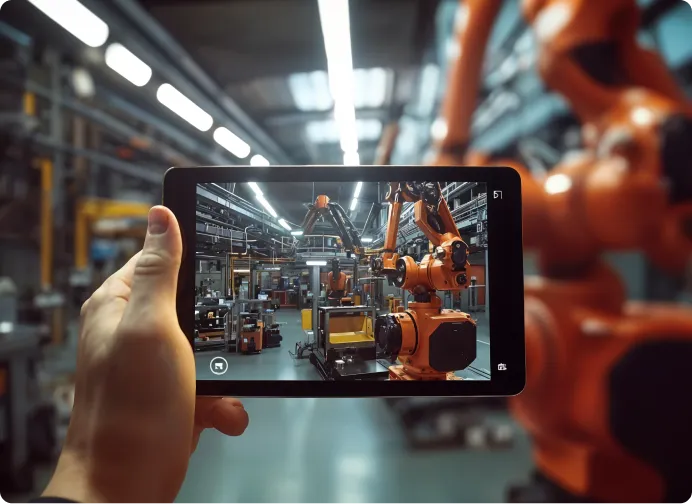Revolutionizing Manufacturing with AR/VR Solutions
Powering Safer, Smarter Operations!

Overview of Augmented Reality (AR) in the Manufacturing Sector
The manufacturing industry has seen a revolution thanks to augmented reality (AR) technologies, which boost productivity, efficiency, and process optimization.
By bridging the digital and physical domains, these technologies provide revolutionary solutions for production workflows and worker training. The quick uptake of AR technology is expected to propel the global AR market, which is expected to reach $198 billion by 2025, according to industry estimates. User manuals have been reinterpreted by AR, transforming from static documents into dynamic, interactive tools. With the help of this innovation, users can interact with 3D models, animations, and step-by-step instructions, which leads to better understanding and more engaging product interactions.
Virtual Assembly Guide
Streamlined Operations
Troubleshooting
Maintenance
AR-Powered Modernization of Conventional User Manuals and Guides

Enhanced Visualization
Improved accessibility
Cost-effective Training
Solutions
Object detection for accurate guidance
Error reduction and increased efficiency
AR/VR streamlines training, enabling faster onboarding and skill acquisition while lowering traditional training costs.
Enhanced Consumer
Experience
What FEKKI Offers!

Custom AR/VR Solutions
We create custom AR applications for manufacturing, from AR assembly guides to VR training simulations.
Existing Systems Integration
Our solutions integrate AR into manufacturing, workflows seamlessly, boosting productivity without disruption.
Ongoing Updates
FEKKI stays updated with the latest advancements in AR technology to offer effective solutions.
Troubleshooting Services
We provide expert AR troubleshooting for smooth operations and quick issue resolution without disruptions.
Frequently Asked Questions (FAQ)
How can virtual reality be implemented in manufacturing?
VR can be implemented in manufacturing for a variety of purposes, such as immersive training simulations, virtual prototyping, and remote collaboration. For example, Ford uses VR to accelerate the design process, reducing prototype production time by up to 90%. VR also allows teams to collaborate in a virtual environment, making decisions faster and more efficiently without the need for travel.
What are the barriers to entry for manufacturing leveraging AR & VR technology?
Common barriers include the initial cost of AR/VR technology, the need for specialized training, and resistance to change within the organization. Additionally, integrating AR/VR into existing workflows can be challenging if the technology is not compatible with current systems or if there is a lack of technical expertise.
Our process is unique to our company. How does FEKKI account for that?
FEKKI specializes in tailoring AR/VR solutions to meet the unique needs of each manufacturing client. We conduct a thorough analysis of your specific processes and customize our technology to integrate seamlessly with your existing workflows. Our solutions are designed to be flexible and adaptable, ensuring they provide maximum value and efficiency for your operations.
How does AR/VR reduce costs in manufacturing?
AR/VR reduces costs by enabling virtual prototyping, which cuts down the need for expensive physical models and multiple iterations, saving companies up to 30% on prototyping costs
How does AR/VR optimize training processes in manufacturing?
AR/VR technologies provide immersive training experiences that increase knowledge retention and reduce training time by up to 55%. Employees can practice real-world scenarios in a risk-free virtual environment, leading to more skilled and confident workers.
How do AR/VR technologies enhance workplace safety?
AR/VR allows employees to simulate dangerous scenarios and practice safety procedures in a virtual environment, reducing the risk of accidents by 40%. This hands-on training approach helps workers understand and respond to hazards more effectively.
How do AR/VR technologies improve product design and development?
AR/VR enables virtual prototyping, allowing designers and engineers to visualize and test products in a virtual space before creating physical models. This reduces the need for costly iterations and accelerates the product development cycle.
What specific industries within manufacturing benefit the most from AR/VR technologies?
Industries such as automotive, aerospace, electronics, and heavy machinery manufacturing benefit greatly from AR/VR technologies due to their complex processes, need for precise assembly, and high standards for quality control.
